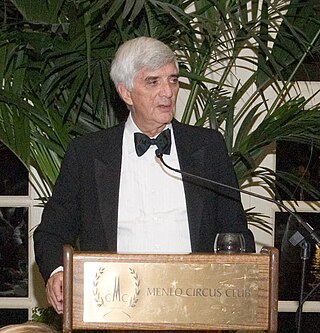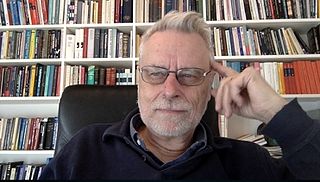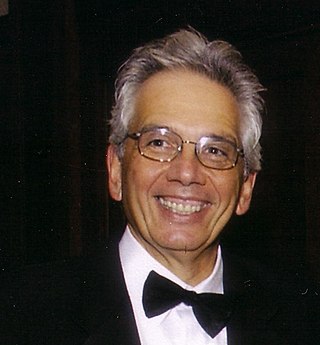Related Research Articles

John Edward Hopcroft is an American theoretical computer scientist. His textbooks on theory of computation and data structures are regarded as standards in their fields. He is a professor emeritus at Cornell University, co-director of the Center on Frontiers of Computing Studies at Peking University, and the director of the John Hopcroft Center for Computer Science at Shanghai Jiao Tong University.

The Shanghai University of Engineering Science is a municipal public university located in Shanghai, China. It is affiliated with the Shanghai Municipal People's Government.

Robert Wendell Lucky was an American electrical engineer, inventor, and research manager at Bell Labs and Bell Communications Research (Bellcore). He is best known for his writings and speeches about technology, society, and engineering culture. Bob is a Fellow of the IEEE and a member of the National Academy of Engineering. He is also a member of TTI/Vanguard's advisory board.

Yu Hsiu Ku or Gu Yuxiu was a Chinese-American electrical engineer, musician, novelist, poet, and politician. A polymathic academic, he was one of the first Chinese people to earn a doctorate from the Massachusetts Institute of Technology, in 1928, and became a leader in higher education in China until the fall of the Republic of China in 1949. Afterwards, he worked for many years as a professor of electrical engineering at the University of Pennsylvania.

Anders Gunnar Lindquist is a Swedish applied mathematician and control theorist. He has made contributions to the theory of partial realization, stochastic modeling, estimation and control, and moment problems in systems and control. In particular, he is known for the discovery of the fast filtering algorithms for (discrete-time) Kalman filtering in the early 1970s, and his seminal work on the separation principle of stochastic optimal control and, in collaborations with Giorgio Picci, the Geometric Theory for Stochastic Realization. Together with late Christopher I. Byrnes and Tryphon T. Georgiou, he is one of the founder of the so-called Byrnes-Georgiou-Lindquist school. They pioneered a new moment-based approach for the solution of control and estimation problems with complexity constraints.
Dr. Hui Liu is a Chinese American professor and an entrepreneur in the field of wireless and satellite communications. He is a prolific researcher with more than 200 scholarly articles and 2 textbooks, and a creative innovator with 67 awarded patents in areas ranging from wireless systems, signal processing, satellite networks, to machine learning. He has more than 12,000 paper citations and an H-index of 56 as of 2018. Dr. Liu is also one of the principal designers of three industrial standards on cellular networks, terrestrial broadcasting, and satellite communications, respectively.

Demetri Terzopoulos is a Greek-Canadian-American computer scientist and entrepreneur. He is currently a Distinguished Professor and Chancellor's Professor of Computer Science in the Henry Samueli School of Engineering and Applied Science at the University of California, Los Angeles, where he directs the UCLA Computer Graphics & Vision Laboratory.
Fadhel M. Ghannouchi is a Tunisian-Canadian electrical engineer, who conducts research in radio frequency (RF) technology and wireless communications.
Mérouane Debbah is a researcher, educator and technology entrepreneur. Over his career, he has founded several public and industrial research centers, start-ups and held executive positions in leading ICT companies. He is now professor at Khalifa University in Abu Dhabi, United Arab Emirates and founding director of the Khalifa University 6G Research Center. He is a frequent keynote speaker at international events in the field of telecommunication and AI. His research has been lying at the interface of fundamental mathematics, algorithms, statistics, information and communication sciences with a special focus on random matrix theory and learning algorithms. In the communication field, he has been at the heart of the development of small cells (4G), massive MIMO (5G) and large intelligent surfaces (6G) technologies. In the AI field, he is known for his work on large language models, distributed AI systems for networks and semantic communications. He received multiple prestigious distinctions, prizes and best-paper awards for his contributions to both fields and according to research.com is ranked as the best scientist in France in the field of electronics and electrical engineering.

Richard D. Gitlin is an electrical engineer, inventor, research executive, and academic whose principal places of employment were Bell Labs and the University of South Florida (USF). He is known for his work on digital subscriber line (DSL), multi-code CDMA, and smart MIMO antenna technology all while at Bell Labs.
Mao Junfa is a Chinese engineer and academic. He is a professor of engineering at Shanghai Jiao Tong University (SJTU).
Mei Hong is a Chinese computer scientist, a professor at Peking University, the director of Key Laboratory of High Confidence Software Technologies of Ministry of Education (MOE) at Peking University. He serves as President of the China Computer Federation (2020-2024), formerly the Vice President of The Academy of Military Sciences, Beijing Institute of Technology, and Shanghai Jiao Tong University. He is an academician of the Chinese Academy of Sciences, a foreign member of the Academia Europaea, a fellow of The World Academy of Sciences, an IEEE Fellow, and an ACM Fellow.
Rakhesh Singh Kshetrimayum, FIET, SMIEEE is an electrical engineer, educator and Professor in the department of Electronics and Electrical Engineering, Indian Institute of Technology Guwahati.
Ernest Shiu-Jen Kuh was a Chinese-born American electrical engineer. He served as Dean of the College of Engineering of the University of California, Berkeley.

Franklin F. Kuo was a professor in many universities — Polytechnic Institute of Brooklyn, University of Hawaii, Stanford University, Jiao Tong University and University of Mannheim. He is the author of 8 books in network theory and on computer network communications. For over 40 years, he was a university professor, a research engineer, a US Defense Department manager, an Internet advisor in China, and an entrepreneur in Silicon Valley and China. He was best known as the co-developer to ALOHANET, along with Norman Abramson, at the University of Hawaii, 1969–1972.
Zhang Xu was a Chinese telecommunications engineer and academic who taught for more than five decades at Shanghai Jiao Tong University and the University of Electronic Science and Technology of China. He was the first professor in China to teach radio communications and played a major role in the development of fiber-optic communication in the country. He was elected an academician of the Chinese Academy of Sciences in 1980.
Thomas H. Lee was a Chinese-American electrical engineer and writer. He worked for General Electric for 30 years, where he developed the first practical vacuum interrupter and the silicon rectifier in the 1960s. In the 1980s he served as the Philip Sporn Professor of Energy Processing at the Massachusetts Institute of Technology and co-chaired the MIT Sloan School's Management of Technology program. He was elected a member of the National Academy of Engineering in 1975 and a foreign member of the Chinese Academy of Engineering in 2000. He was an IEEE Fellow and received the IEEE Haraden Pratt Award in 1983.
Thomas George Thundat is an Indian-American scientist. He is currently the SUNY Distinguished Professor and a SUNY Empire Innovation Professor of Chemical & Biological Engineering at the University at Buffalo. Thundat conducts research in the field of nanosensors and microcantilevers.
Hong Z. Tan is a Chinese-American researcher in haptic technology and haptic perception. She is a professor of electrical and computer engineering at Purdue University.
Meixia (Melissa) Tao is a Chinese electrical engineer whose research concerns resource allocation in wireless networks, beamforming, and edge computing. She is a distinguished professor of electronic engineering at Shanghai Jiao Tong University.
References
- ↑ "IEEE Fellows 2015". IEEE Communications Society. Retrieved 2020-01-05.
- ↑ "Robert Caiming Qiu". Shanghai Jiao Tong University. Retrieved 2020-01-05.